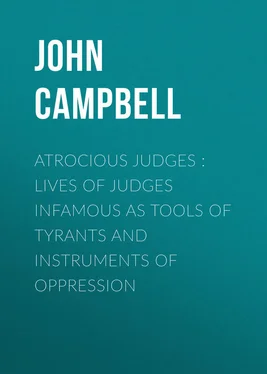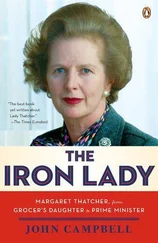John Campbell - Atrocious Judges - Lives of Judges Infamous as Tools of Tyrants and Instruments of Oppression
Здесь есть возможность читать онлайн «John Campbell - Atrocious Judges - Lives of Judges Infamous as Tools of Tyrants and Instruments of Oppression» — ознакомительный отрывок электронной книги совершенно бесплатно, а после прочтения отрывка купить полную версию. В некоторых случаях можно слушать аудио, скачать через торрент в формате fb2 и присутствует краткое содержание. Жанр: foreign_antique, foreign_prose, Биографии и Мемуары, на английском языке. Описание произведения, (предисловие) а так же отзывы посетителей доступны на портале библиотеки ЛибКат.
- Название:Atrocious Judges : Lives of Judges Infamous as Tools of Tyrants and Instruments of Oppression
- Автор:
- Жанр:
- Год:неизвестен
- ISBN:нет данных
- Рейтинг книги:5 / 5. Голосов: 1
-
Избранное:Добавить в избранное
- Отзывы:
-
Ваша оценка:
- 100
- 1
- 2
- 3
- 4
- 5
Atrocious Judges : Lives of Judges Infamous as Tools of Tyrants and Instruments of Oppression: краткое содержание, описание и аннотация
Предлагаем к чтению аннотацию, описание, краткое содержание или предисловие (зависит от того, что написал сам автор книги «Atrocious Judges : Lives of Judges Infamous as Tools of Tyrants and Instruments of Oppression»). Если вы не нашли необходимую информацию о книге — напишите в комментариях, мы постараемся отыскать её.
Atrocious Judges : Lives of Judges Infamous as Tools of Tyrants and Instruments of Oppression — читать онлайн ознакомительный отрывок
Ниже представлен текст книги, разбитый по страницам. Система сохранения места последней прочитанной страницы, позволяет с удобством читать онлайн бесплатно книгу «Atrocious Judges : Lives of Judges Infamous as Tools of Tyrants and Instruments of Oppression», без необходимости каждый раз заново искать на чём Вы остановились. Поставьте закладку, и сможете в любой момент перейти на страницу, на которой закончили чтение.
Интервал:
Закладка:
The defendant, being found guilty, was ordered to pay a fine to the king of £5000, and to be imprisoned – without prejudice to the remedy of Mr. Justice Hutton by action. Such an action was accordingly brought, and so popular was Mr. Justice Hutton, that he recovered £10,000 damages; whereas it was said that, if the chief justice had been the plaintiff in an action for defamation, he need not have expected more than a Norfolk groat.
Lord Chief Justice Brampston’s services were likewise required in the Star Chamber. He there zealously assisted Archbishop Laud in persecuting Williams, Bishop of Lincoln, ex-keeper of the great seal. When the sentence was to be passed on this unfortunate prelate, ostensibly for tampering with the witnesses who were to give evidence against him on a former accusation, which had been abandoned as untenable, but in reality for opposing Laud’s Popish innovations in religious ceremonies, Brampston declaimed bitterly against the right reverend defendant, saying, —
“I find my Lord Bishop of Lincoln much to blame in persuading, threatening, and directing of witnesses – a foul fault in any, but in him most gross who hath curam animarum throughout all his diocese. To destroy men’s souls is most odious, and to be severely punished. I do hold him not fit to have the cure of souls, and therefore I do censure him to be suspended tam ab officio quam a beneficio , to pay a fine of £10,000, and to be imprisoned during the king’s pleasure.”
This sentence, although rigorously executed, did not satiate the vengeance of the archbishop; and the bishop, while lying a prisoner in the Tower, having received some letters from one of the masters of Westminster School, using disrespectful language towards the archbishop, and calling him “a little great man,” a new information was filed against the bishop for not having disclosed these letters to a magistrate, that the writer might have been immediately brought to justice. Of course he was found guilty; and when the deliberation arose about the punishment, thus spoke Lord Chief Justice Brampston: —
“The concealing of the libel doth by no means clear my Lord Bishop of Lincoln, for there is a difference between a letter which concerns a private person and a public officer. If a libellous letter concern a private person, he that receives it may conceal it in his pocket or burn it; but if it concern a public person, he ought to reveal it to some public officer or magistrate. Why should my Lord of Lincoln keep these letters by him, but to the end to publish them, and to have them at all times in readiness to be published? I agree in the proposed sentence, that, in addition to a fine of £5000 to the king, he do pay a fine of £3000 to the archbishop, seeing the offence is against so honorable a person, and there is not the least cause of any grievance or wrong that he hath done to my Lord of Lincoln. For his being degraded, I leave it to those of the Ecclesiastical Court to whom it doth belong. As to the pillory, I am very sorry and unwilling to give such a sentence upon any man of his calling and degree. But when I consider the quality of the person, and how much it doth aggravate the offence, I cannot tell how to spare him; for the consideration that should mitigate the punishment adds to the enormity of the offence.”
As no clerical crime had been committed for which degradation could be inflicted, and as it was thought not altogether decent that a bishop, wearing his lawn sleeves, his rochet, and his mitre, should stand on the pillory, to be pelted with brickbats and rotten eggs, the lord chief justice was overruled respecting this last suggestion, and the sentence was limited to the two fines, with perpetual imprisonment. The defendant was kept in durance under it till the meeting of the Long Parliament, when he was liberated; and, becoming an archbishop, he saw his persecutor take his place in the Tower, while he himself was placed at the head of the Church of England.
Now came the time when Lord Chief Justice Brampston himself was to tremble. The first grievance taken up was ship money; and both houses resolved that the tax was illegal, and that the judgment against Hampden for refusing to pay it ought to be set aside. Brampston was much alarmed when he saw Strafford and Laud arrested on a charge of high treason, and Lord Keeper Finch obliged to fly beyond the seas.
The next impeachment voted was against Brampston himself and five of his brethren; but they were more leniently dealt with, for they were only charged with “high crimes and misdemeanors;” and happening to be in the House of Lords when Mr. Waller brought up the impeachment, it was ordered “that the said judges for the present should enter into recognizances of £10,000 each to abide the censure of Parliament.” This being done, they enjoyed their liberty, and continued in the exercise of their judicial functions; but Mr. Justice Berkeley, who had made himself particularly obnoxious by his indiscreet invectives against the Puritans, 51 51 Some of our American federal judges are in the habit of declaiming much in the same style against abolitionists – who, indeed, may be considered as occupying a position in our present affairs in many respects parallel to that of the English Puritans in the times of Charles I. — Ed.
was arrested while sitting on his tribunal in Westminster Hall, and committed a close prisoner to Newgate.
Chief Justice Brampston tried to mitigate the indignation of the dominant powers by giving judgment in the case of Chambers v. Sir Edward Brunfield, Mayor of London , against the legality of ship money. To an action of trespass and false imprisonment, the defendant justified by his plea under “a writ for not paying of money assessed upon the plaintiff towards the finding of a ship.” There was a demurrer to the plea, so that the legality of the writ came directly in issue. The counsel for the defendant rose to cite Hampden’s case and Lord Say’s case, in which all their lordships had concurred, as being decisive in his favor; but Brampston, C. J., said, —
“We cannot now hear this case argued. It hath been voted and resolved in the upper House of Parliament and in the House of Commons, nullo contradicente , that the said writ, and what was done by color thereof, was illegal. Therefore, without further dispute thereof, the court gives judgment for the plaintiff.” 52 52 Having once refused to hear counsel against ship money, he now undertook to square the account by refusing to hear counsel for it. — Ed.
The Commons were much pleased with this submissive conduct, but pro forma they exhibited articles of impeachment against the chief justice. To the article founded on ship money he answered, “that at the conference of the judges he had given it as his opinion that the king could only impose the charge in case of necessity, and only during the continuance of that necessity.”
The impeachment was allowed to drop; and the chief justice seems to have coquetted a good deal with the parliamentary leaders, for, after the king had taken the field, he continued to sit in his court at Westminster, and to act as an attendant to the small number of peers who assembled there, constituting the House of Lords.
But when a battle was expected, Charles, being told that the chief justice of England was chief coroner, and, by virtue of his office, on view of the body of a rebel slain in battle, had authority to pronounce judgment of attainder upon him, so as to work corruption of blood and forfeiture of lands and goods, thought it would be very convenient to have such an officer in the camp, and summoned Lord Chief Justice Brampston to appear at head quarters in Yorkshire. The Lords were asked to give him leave of absence, to obey the king’s summons, but they commanded him to attend them day by day at his peril. He therefore sent his two sons to make his excuse to the king. His majesty was highly incensed by his asking leave of the Lords, and – considering another apology that he made, about the infirmity of his health and the difficulty of travelling in the disturbed state of the country, a mere pretence – by a supersedeas under the great seal dismissed him from his office, and immediately appointed Sir Robert Heath to be chief justice of England in his stead.
Читать дальшеИнтервал:
Закладка:
Похожие книги на «Atrocious Judges : Lives of Judges Infamous as Tools of Tyrants and Instruments of Oppression»
Представляем Вашему вниманию похожие книги на «Atrocious Judges : Lives of Judges Infamous as Tools of Tyrants and Instruments of Oppression» списком для выбора. Мы отобрали схожую по названию и смыслу литературу в надежде предоставить читателям больше вариантов отыскать новые, интересные, ещё непрочитанные произведения.
Обсуждение, отзывы о книге «Atrocious Judges : Lives of Judges Infamous as Tools of Tyrants and Instruments of Oppression» и просто собственные мнения читателей. Оставьте ваши комментарии, напишите, что Вы думаете о произведении, его смысле или главных героях. Укажите что конкретно понравилось, а что нет, и почему Вы так считаете.












